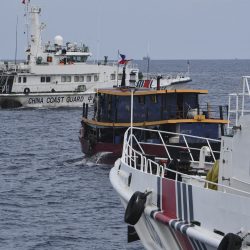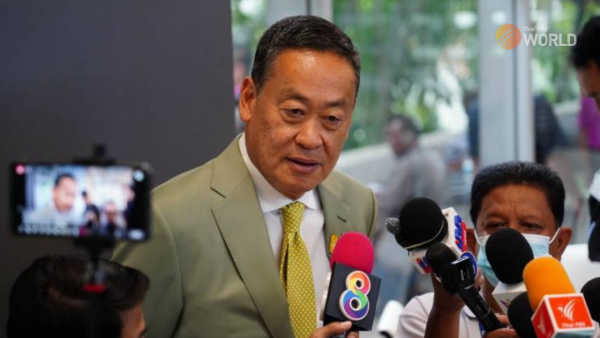Business as usual: Are Thailand’s ‘green economy’ plans just greenwash?

Thailand’s vision for a green economy fails to tackle the country’s environmental problems at their root, say many environmentalists, who accuse the government of prioritizing big business at the expense of our common habitat.
“I fear that the [sustainable economy] model adopted by the government will only benefit major industry operators, who are in fact the biggest polluters,” said Witoon Lianjamroon, director of sustainable food network Bio Thai.
Witoon spoke as Thai government representatives are preparing their environment-protection plans for presentation at COP28 (the 28th Conference of the Parties to the UN Framework Convention on Climate Change) in Dubai next month.
Thailand’s 20-year national development strategy, forged by the previous junta regime, has come under strong criticism from environmental groups across the country.
Baramee Chaiyarat, an advisor to the Assembly of the Poor, said the national strategy would actually turn most poor farmers’ plots into carbon-sink forests by 2037.
“I can’t help feeling that the carbon credit trade poses a new threat to poor Thais,” he said.
The Assembly of the Poor has been rallying hard against carbon credit initiatives, which it labels as “fake” and “useless” efforts to combat climate change. It says that carbon credit schemes only give polluters carte blanche to continue with their polluting practices at the expense of the environment and human health in general.
That claim was backed recently by an investigation of the world’s top 50 carbon credit schemes conducted by the UK’s Guardian newspaper and business watchdog Corporate Accountability. It found that the majority of carbon credits studied were “junk”, or worthless when it came to reducing climate-warming emissions.
“If you really want to curb the impact industrial operations have on the environment, you have to tackle the problem at its root. You need to first change the polluting manufacturing and service practices that create mass harmful emissions,” Baramee said.
Policies shaped by big businesses?
Tara Buakamsri, director of Greenpeace Thailand, said Thailand’s latest Climate Action Conference provided clear proof that big businesses were leading the country’s climate-change policies in ways that benefited themselves at the expense of the environment.
“The government is now talking about green finance proposals, carbon-sink programs, carbon neutrality and net-zero carbon emissions. But all these plans are basically about handing over a huge portion of farmland or forests to investors who want a stake in the carbon-credit trade so that fossil-fuel-related industries can continue emitting greenhouse gases,” he said.
Under Thailand’s net-zero emission plan, greenhouse gas emissions from energy, agriculture and other industries will reach 120 million tons by 2065. To offset these massive emissions and achieve net zero, Thailand will have to expand its forestland by another 28 million rai (4.48 million hectares) as a carbon sink. Currently, 134 million rai of the country is covered in forest.
Thailand’s recent Sustainability Expo 2023 also saw big businesses out in force, touting supposed green schemes such as carbon credits.
Witoon said the government’s so-called green economy plan or BCG (bio-circular-green) model is disconnected from the people’s sector, local communities and even independent academics.
“It’s as if big businesses have monopolized this field. If such a monopoly really exists and continues, this will be a huge mistake that leads to many more problems,” he warned.
Witoon said carbon credits linked to government initiatives will allow big businesses, including foreign corporations, to use Thailand’s forests as carbon sinks.
“Should they really be allowed to do this at a time when Thailand has so many landless farmers and while the public is locked out of forest management?” he said.
What will people get?
Somboon Kamhaeng, who chairs the NGO Coordinating Committee on Development, said that as of September last year, 17 companies had received permits to operate carbon-credit activities in Thai mangrove forests.
A contract agreed between one of these companies and a community shows that the community initially received 200,000 baht and will be paid 450 baht per rai of forestland that it maintains as a carbon sink. However, this is only for the first year. From the second to the 30th year, its earnings will drop by more than half to just 200 baht per rai.
The community will eventually get just a 20% share of benefits while the company will pocket 70%, leaving just 10% for the Department of Marine and Coastal Resources which is tasked with conserving mangroves.
Greenpeace Thailand calculates the company will end up making 1.52 billion baht from the carbon sink over 30 years, while the community will make just 435 million baht and the department just 217 million baht.
Somboon said it takes communities decades to grow a lush mangrove forest, but the actual benefits will only go to the company involved.
In addition, the so-called benefits-sharing contract gives all rights to use the forest to the company. In other words, local residents have no ownership over the community forests they have long taken care of. Instead, they will need to seek prior approval from the company to make any changes in their forestland.
Witoon pointed out that, if the government does not intervene, local communities will eventually sell their rights to manage or utilize their natural resources in exchange for only small amounts of money.
What is the new government’s pledge?
Prime Minister Srettha Thavisin, who took office only two months ago, has declared that his administration will leave no one behind as Thailand embarks on its journey to a low-carbon society.
“We know that many people, farmers, communities and small businesses have not recognized the severity of the climate-change crisis yet, or have not yet found solutions,” Srettha told the ESG Symposium on October 5. “So, we are going to enhance their access to technology and funding for efforts to fight against climate change. We expect them to adapt and survive.”
At the symposium, he encouraged big businesses to teach small operators and communities how to apply the ESG (environmental, social and governance) concepts and collaborate with relevant sectors to drive tangible efforts.
Greenpeace Thailand says that the PM’s focus on ESG principles indicates the government is only concerned with mitigating environmental impacts, rather than actually adopting sustainable solutions.
“The government needs to understand that there are losses and damages from carbon emissions. Don’t just think about greenwashing or offsetting carbon with forests,” it said.
Witoon added that when the government talks about the green economy, it has not mentioned efforts to combat air pollution from the burning of farm waste – a growing seasonal health hazard in Thailand.
“Worsening air pollution has made people ill, with many even hospitalized. Yet, not one company has addressed these issues,” he said.
Baramee, meanwhile, pointed out that carbon-credit projects now encourage people to grow sugarcane for biomass power plants.
“This means that even though agricultural waste is not burned outdoors, it is being burned in power plants and emits greenhouse gases all the same,” he said.
By Thai PBS World’s General Desk






